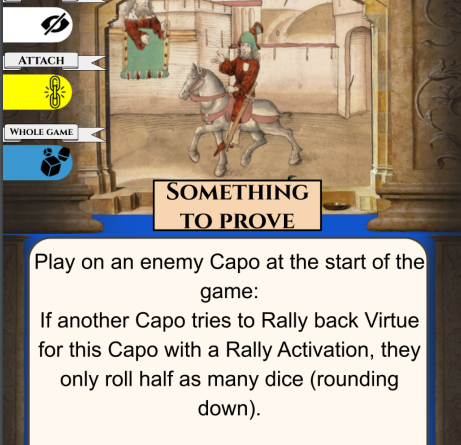Simulating Command and Control in Wargames: A Masterstroke Games Take
“There have been some who in my time have been cashier’d and degraded their Nobility, others who have lost their Lives upon a Scaffold, others dishonoured and dismist to their own Houses, without ever having been more regarded either by the King or any other: And on the contrary, I have seen others who have trail’d a Pike at six Francs pay, arrive at great Preferments, performing things so brave, and manifesting themselves men of so great Capacity, that several who in their Original have been no better than the Sons of poor labouring Men, have rais’d themselves above many of the Nobility by their Prowess and Virtue.”
Wargames by nature have a very hard time simulating command and control. It’s a fuzzy aspect in warfare, especially at the small-scale where it’s often one person’s decision (or indecision) that is critical to the outcome. However, training the individual and finding the right people to make the right choices is always something that comes out in our sources, both biographies and manuals. We obviously mention the Italian fencing master Fiore de Liberi, we use his virtues as the basis of our system, extrapolating what he describes the perfect fencer should have (Audaciousness, Fortitude, Prudence and Speed) into a way of describing your commanders.
It’s not just Fiore either. The condottiere and military theorist Pietro Monte in his book “Collectanea” of military strategy and martial arts separates soldiers in the four humours, which roughly correspond to Fiore’s virtues. For example, he recommends commanders to keep their Phlegmatic (Prudence) troops in reserve:
“Chapter 55: How phlegmatics should be put in the last place in battle
In battle, phlegmatics should be in the last place, since it takes quite a while before strength, condition, and spirit are fortified in them. All of these increase together, for when the body is weak it cannot muster its own capacity for working in orderly fashion. Although phlegmatics are as strong as sanguines (Speed), in the beginning they are in a sort of drowsy state, so they should exercise their bodies for a while before coming to the main fight. Once they are exercised it is difficult to defeat them, since the advantage that sanguines enjoy over phlegmatics in the first onrush, phlegmatics afterwards have over sanguines. “
Pietro Monte, “Collectanea”, Trans. Mike Prendergast
You’ll find that likewise in Force of Virtue, your troops and Capos with high Speed are best suited to rush in and overwhelm the enemy, yet if you rely on only speed then they will quickly tire if they can’t end the fight in time. At risk of tooting our own horn the Collectanea translation was released after the Virtue system was developed. Which was of course gratifying as researchers to see a thesis ratified. This psychological theory of troops and warfare is what lies at the heart of Force of Virtue, you must know your commanders and how they operate. You must manage your troops carefully, lest their virtues turn to vices.
We prefer this method of simulating command and control as other systems, such as random event cards or tables, can be a bit too random for our taste. One would hope that a commander might know roughly how his sub-commanders might act in the field. That being said, your opponent can have a vote in that too with the right cards, to inject a little of the instability and discord that is often reported in late-mediaeval command structures. A Capo with the card Something to Prove for example simply won’t allow anyone else to help him even when he desperately needs it.(Card image)

We prefer putting these command and control hiccups in the players hands, although less random (and we do agree that war is random!), it makes sure that these events matter in the game by being targeted where it hurts rather than happening somewhere on the sidelines where it’s more of an administrative hurdle than a fun gameplay element. Many can also be played around after your opponent attaches them to one of your models, adding to that feeling of having to manage your Capos despite the failings that they might bring to the field.
This is one area that we want to add more ideas into, and if you have any ideas on ones to implement (bonus points if it comes with a relevant anecdote!) then write them on the Discord server where we can discuss how best to implement them for our next scenario deck!



